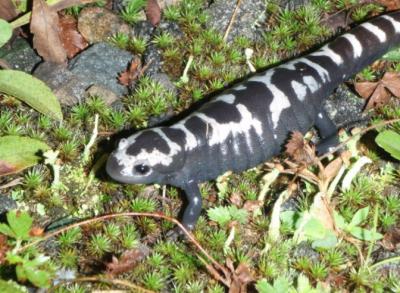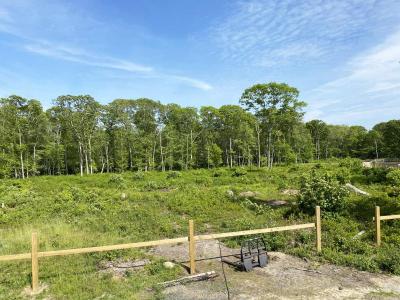Family at odds with Attorney General over salamander habit protection
A South Dartmouth family and the state are currently in a legal dispute over potentially disrupting “priority habitat” for marbled salamanders and violating state environmental laws.
Resident Marissa Massucco said the issue arose after her family removed trees to create a grazing pasture for horses on their Allens Neck Road property, adding that their real estate agent, closing attorney, and the town’s Conservation Committee were unaware of any priority habitats on the 12-acre property.
“They said it was no problem,” she said. “Nobody knew.”
Massucco added that the only protected lands the family was aware of were three acres of designated wetlands.
Meanwhile, a civil complaint filed by the Massachusetts Attorney General’s office in 2019 claims that although the Conservation Commission was notified, the Massuccos violated the state law by not alerting the Division of Fisheries and Wildlife until after two and a half acres of land were cleared.
The suit was filed on behalf of the Division of Fisheries and Wildlife.
The state is currently seeking $25,000 per day for each violation of the Wetlands Protection Act, along with $10,000 per day for violating MESA. According to a spokesperson from the AG’s office, the penalty is “standard for violations, as we do in all complaints our office files.”
Massucco said that the numbers add up to more than $42 million — a total the state disputes.
“It makes no sense,” she said. “Our property wouldn’t be worth anything — we certainly don’t have any spare millions sitting around.”
The complaint also notes that the property could return to state compliance by submitting a plan for approval to restore the cleared land.
“Our office always seeks reasonable penalties that are in line with what the court has awarded in similar cases,” the spokesperson said.
The complaint added that the Dartmouth family was informed that clearing the property’s trees had caused direct harm to individual marbled salamanders and “disrupted migratory, breeding, feeding, sheltering, and overwintering activity of the local marbled salamander population.”
Massucco called the state’s allegations “ridiculous,” adding that she has still yet to see any salamanders on the land.
“We never would have moved here if we had known that,” she added. “We had no idea.”
According to the complaint, the property has been mapped by the Division of Fisheries and Wildlife as marbled salamander Priority Habitat since 1995 and that designation was “provided to all local conservation commissions and planning boards.” The complaint alleges that the family continued to clear land after getting warned by the state.
“After becoming aware of this clear cut, the Division informed Massucco that no further clearing activity or other physical disturbance of marbled salamander habitat could occur on his property unless permitted under MESA,” it read. “Instead of complying with the required consultation and permitting process, Massucco continued to violate MESA by clearing at least one acre of additional marbled salamander upland habitat without notifying the Division.”
The Dartmouth resident said that even with the clearing, the potential salamanders still have “so much space” at nearby properties such as Allens Pond.
“It’s not like they don’t have anywhere to go if they’re here,” she said.
According to the Division of Fisheries and Wildlife, approximately 85 local populations had been documented among 61 towns in the commonwealth as of 2015, adding that local populations in the state are “relatively small.” The species is considered threatened, but not endangered.
Marbled salamanders typically inhabit areas with well-developed leaf litter, abundant coarse woody debris, loose soils, predominantly closed canopy tree cover, and abundant rodent tunnels. The salamanders also need to live in areas with access to small pools of fishless water where they breed.
The most common types of habitat loss are the clearing of forests and the filling (or draining) of natural pools during residential, commercial, industrial, mining, or agricultural development.
“Adult survivorship appears critical to population persistence, especially at sites where reproductive output is low, or reproductive failures are common,” a report from the division read.
As the dispute continues, Massucco said the state plans to send scientists to the South Dartmouth property to look for salamanders — something the AG’s office said both parties agreed to.
“It’s so absurd,” Massucco said. “We’re just private citizens.”
The complete text of the lawsuit is attached to this story.














